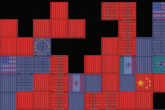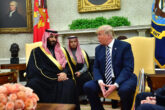June 10, 2019
Strengthening Congress’ Role in Sanctions
Congress’ role in U.S. sanctions policymaking is not a new phenomenon, but it has taken on increased resonance in the past decade. The passage of legislation, such as the Iran Nuclear Agreement Review Act (2015) and the Countering America’s Adversaries Through Sanctions Act (2017), have institutionalized Congress’ role in imposing some restrictions on the Executive’s ability to use (or relent in the use of) its sanctions authorities. Congress should embrace this role in a way that does not weaken the messages the United States wishes to send adversaries and allies through its use of sanctions. Much of the current sanctions posture, especially the overuse and inclination to reach for them as the first too to use, will only encourage U.S. allies and adversaries to build alternatives to the U.S.-centric financial system on which sanctions’ effectiveness depends.
Congress has three broad roles to play in the use of sanctions:
- Creating and maintain the enabling legislation that authorizes or requires the use of sanctions against specific bad actors for specific conduct or status. Recently, these pieces of legislation are increasingly trending to mandatory authorities seeking broad macroeconomic impacts on U.S. adversaries;
- Overseeing the administration personnel who are implementing and enforcing sanctions policy. Oversight hearings have probed the rationale for specific sanctions strategies, with special focus on the administration’s approach to Russia sanctions. Congress also has an important role to play in resourcing U.S. sanctions strategy; in recent years, Congress has realized that the Treasury Department is under-staffed and under-budget as compared to requirements, a shortcoming which has been addressed to some extent in recent appropriations bills;
- Direct oversight of the lifting of Russia sanctions, thanks to CAATSA, a space where Congress needs to tread very carefully. While Congress must ensure that sanctions are being lifted for proper policy reasons, it must also guard against unrealistic standards for behavior change by designated entities.
To-date, Congress has often succeeded in buttressing (or, in some cases, forcing) a strong Executive approach to sanctions. There is a strong consensus, for example, on the applicability of sanctions in the context of denying North Korea the financial resources needed to sustain its weapons of mass destruction programs, notwithstanding the ebb and flow of the current diplomatic process. Proposed legislation like the Banking Restrictions Involving North Korea (BRINK) Act of 2017 builds on initiatives already undertaken by the administration in cutting off banking channels for Pyongyang. The signaling in this instance is clear: formal financial links with North Korea are off-limits as far as the United States is concerned (a view embraced in United Nations sanctions as well).
In other circumstances, however, the approach of the administration, but also Congress, has led to confusion among U.S. partners and even U.S. adversaries about the intent of U.S. sanctions policy. In extreme cases, this has been done in such a way as to weaken the use of the tool overall. The question over whether or not the administration or Congress would lead the charge on sanctioning the Nord Stream 2 natural gas pipeline linking Russia and Germany is one example. After the State Department issued its CAATSA Section 232 Guidance in October 2017, subsequent legislation initially avoided going back to specific measures targeting either Nord Stream 2, or energy resource pipelines in general. More recently, however, newly proposed legislation seeks to impose sanctions on the maritime construction companies involved, even though the pipeline is almost complete. Even those analysts who disagree with the wisdom of building the pipeline have questioned the wisdom of sanctioning it, especially after so much time has passed since the signing of CAATSA.
The de-listing of RUSAL, which represented the first instance of Congress exercising the review mechanism it instituted under CAATSA, also sent mixed signals to both allies and adversaries. Oleg Deripaska, a Russian oligarch believe close to Russian President Vladimir Putin, saw his main corporate holdings designated in April 2016. The addition of RUSAL, one of the world’s largest aluminum companies, sent a shock through global commodities markets. It started a protracted process that led eventually to Deripaska giving up control of the company. Congress, however, challenged the de-listing, very narrowly voting to approve the deal in January 2019. Congressional opposition focused on the idea that Deripaska had not been punished enough, despite the fact that he remained on the SDN list in his personal capacity. For U.S. partners, it was yet another example of where their significant economic exposure to RUSAL’s operations was sidelined in U.S. decision-making in order to apply more pressure to Russia, despite the fact that it was not entirely clear that targeting oligarchs actually changed decision-making in Moscow.
Some of these outcomes are the natural outgrowth of substantive policy disagreements between two co-equal branches of the government. Others, however, are due to the politics of sanctions that currently prevail in the United States. Creating the expectation that securing a de-listing from sanctions requires a targeting meeting extremely high or an impossible to meet bar risks permanent tension between the legislative and executive branch on important strategic and legal questions, and robs sanctions of their incentive for behavior change in the target. Congress can better navigate the political tensions around sanctions by building a more institutionalized and less ad hoc approach to creating new sanctions authorities, and in wielding oversight of the administration. There is a current expertise gap which is contributing to some of the signaling issues. Addressing it will not solve all of the issues involved in signaling around sanctions, but more coherent Congressional approach can help how the United States sends signals to its partners and adversaries in many cases.
Congress can build institutional capacity for its sanctions posture in three immediate ways:
- Hire more professional staff members whose functional responsibilities are dedicated to sanctions policy;
- Congress should issue an annual report measuring the impact of sanctions policies on the economic fundamentals of U.S. adversaries;
- Additional funding increases for the U.S. Treasury Department should include specific resources for full-time personnel who are dedicated to Congressional relations.
Neil Bhatiya is the Associate Fellow for the Energy, Economics, and Security Program at the Center for a New American Security. His work focuses on the geopolitics of energy, climate change, and tools of economic statecraft.
Read more in the CNAS Grappling with the Growing Use of Sanctions commentary series.
More from CNAS
-
Game Over?
The trade wargame suggests that sustained high tariffs could create leverage and urgency to spur action toward a productive restructuring of the international trade system....
By Emily Kilcrease & Geoffrey Gertz
-
Middle East Security / Energy, Economics & Security
Trump Inks $600 Bn Deal In Saudi Arabia | Musk, Blackrock CEO Flank Trump In Gulf VisitIn today's episode of India Global, U.S. President Donald Trump secured a $600 billion commitment from Saudi Arabia on Tuesday to invest in the United States. NDTV's Gaurie Dw...
By Daniel Silverberg
-
Energy, Economics & Security / Technology & National Security
Tariffs and Tech: An Uncertain RecipeHigher tariffs could prompt American cloud companies to shift more of their capital investments abroad....
By Pablo Chavez
-
Trump Tariffs: How Will U.S. Plans Reshape the Global Economy?
Donald Trump says he's already decided the tariffs he will impose on countries that export goods to America, including the United Kingdom. Channel 4 hears from Emily Kilcrease...
By Emily Kilcrease




